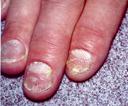|
Psoriasis - What You Should KnowPsoriasis affects 2-3% of the people in the United States. Every year 150,000-260,000 are newly diagnosed. It is often diagnosed in people between ages 15-35. This is a long term (chronic) skin problem. Skin cells grow too quickly resulting in thick, white, silvery or red patches building up. This occurs when our immune system overreacts causing inflammation and flaking of the skin. This is NOT contagious. Normal skin matures and falls off about every 4 weeks. For those with this condition it only takes 3 to 4 days for their skin to mature and instead of falling off it just builds up. The patches, called plaque, range in size from small to large areas. It is most often found on knees, elbows, scalp, hands, feet, or lower back. It is usually found on adults, but children can get it too. Researchers have not found a cause, but it does run in families. Psoriasis can get worse at certain times including cold or dry climates, infections, stress, dry skin, and medications. Smoking, especially in women, makes you more likely to get psoriasis. There are five main types. 1. Plaque - thick red patches covered by flaky, silver-white scales. (most common form 80%) 2. Erythrodermic - red, very intense, and cover a large area (less than 3%) 3. Pustular - white blisters surrounded by red, irritated skin (less than 3%) 4. Guttate - small pink spots (less than 2%) 5. Inverse - red and the irritation occurs in arm pits, groin, and between overlapping skin
Doctors can diagnose just by looking at your skin. No special tests are usually needed. They may take a biopsy. If you have joint pains, x-rays may be taken to diagnose psoriatic arthritis, which affects 10-30% of people already having this condition. There are also nail disorders. The finger and toe nails have a yellowish discoloration and there is a build up of skin debris under the nails.
Having psoriasis can be very uncomfortable and embarrassing. It can be itchy and tender. Some have self esteem issues because of their feeling of embarrassment. Some may avoid swimming. Others may wake up in the middle of the night itching. There are several options for treatment. It is a lot of trial and error to find what works best for each individual. -keep skin moist with lotion -using aloe can be very soothing -soaking in a bath -short exposure to sun light or phototherapy (ultraviolet light) -soften and remove crusts by peeling gently. This will allow the lotion to get through better. -topical medication or oral medication -shampoos to treat the scalp -injections Treatment can continue for a lifetime. Currently there is no cure, but there is hope. Researchers are studying this skin disorder and have already learned a lot about it. While it is not curable yet, it is controllable.

|
To Order Your L'Bri Products Now,
Learn how to protect your skin with these tips to preventing skin cancer.
Click here to learn more.

Here is a great site I found about sun protection. Find out more about skin cancer, sun protection, sunscreen, eye sun protection, and much more!
Click here.
These conditions can really affect one's self esteem. I have found this great site about improving your self esteem and learning to love yourself just as you are.
Click here.







